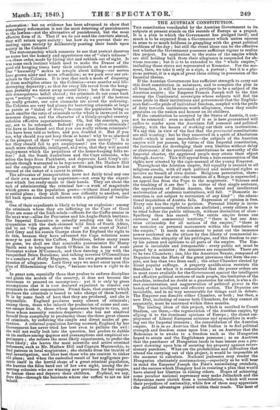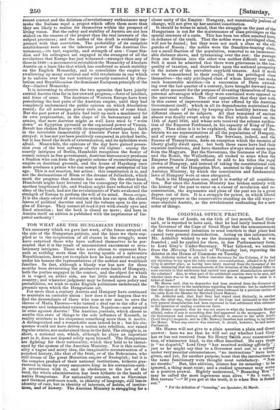THE AUSTRIAN CONSTITUTION.
Tire constitution vouchsafed by the Austrian Government to its subjects at present stands on the records of Europe as a project. It is a plan to which the Government has pledged itself; and much is to be expected from a Government which unites success in arms to so much boldness in grappling with the great political problems of the day ; but still the event alone can be the effective test whether the Government possesses sufficient vigour to realize this project. Its application to the states of the empire which are still holding back from their allegiance is suspended for ob- vious reasons ; but it is to be extended to the " whole empire," including those states not represented at Kremsier. For the mo- ment, then, we take it only as a sign, a portent ; but it is a glo- rious portent, it is a sign of great ideas sitting in possession of the Imperial throne.
If the Austrian Government has sufficient strength to carry out this draft constitution in substance, and to complete the plan in all branches, it will be esteemed a privilege to be a subject of the Austrian empire ; the Emperor Francis Joseph will be the first among the Continental sovereigns whose subjects will feel the same pride in their institutions and government that the English- man feels—the pride of individual freedom, coupled with the pride of duty towards institutions worth allegiance, since they confer greatness on the nation and honour on its children. If the constitution be accepted by the States of Austria, it can- not be retracted: even so much of it as is here guaranteed will suffice to confer upon the Austrians full personal and political liberty, with the means of working out their own institutions. We say this in view of the fact that the provincial constitutions are still wanting: but be they conceived in a spirit of Absolutism itself—which is most improbable—the subjects of the Austrian empire will yet possess, by virtue of this Imperial constitution, the instrument for developing their own liberties without delay or abatement : if the provincial constitutions be unworthy of the Imperial charter, the aggrieved people may attain their object through Austria. This will appear from a bare enumeration of the rights now attested by the sign-manual of the young Emperor. Throughout the Austrian empire, full equality is secured to all religious creeds, with all such political and municipal rights as involve no breach of civic duties. Religious persecution, there- fore, must cease for ever—the vocation of a Ronge is superseded ; an appeal lies from the Pope to the magistrate. "Science and the teaching of it are free" : in virtue of that single sentence, the opprobrium of Italian Austria, the moral and intellectual malversation of academic institutions, will fall. "Domestic in- struction is not subject to restriction of any kind" : the educa- tional inquisition of Austria falls. Expression of opinion is free. Every one has the right to petition. Personal liberty is invio- lable; all patrimonial tribunals are abolished ; every citizen is to be tried before the public tribunals, without distinction of class : Spielberg then has ceased. "The entire empire forms one customs and commercial territory," "there is but one Aus- trian citizenship for all nations of the empire," "there is no restraint on personal movements within the boundaries of the empire." It needs no comment to point out the immense power conferred on the citizen by this liberty of commercial in- tercourse, this ubiquity of his privileges, and this freedom to ear- ly his person and opinions to all parts of the empire. The Em- peror is inviolable and irresponsible : every public act must be signed by a minister ; the ministers are responsible. There are to be two Chambers; one, like the American Senate, composed of Deputies from the Diets of the great provinces that form the em- pire, not less than two from each ; the other Chamber elected by direct popular suffrage. A property qualification restricts the franchise : but when it is remembered that the poorer orders are in most cases available for the Government against the intelligent and effective political sections of each people, the limitation of the franchise, intended no doubt as a guarantee for order, is also a di- rect concentration and augmentation of political power in the bands of that intelligent and effective section. The Deputies are inviolable, and in no way accountable for things said in debate. The Emperor can dissolve either Chamber, or both ; but then, a new Diet, including of course both Chambers, for they cannot sit separately, must be convened within three months. The leading ideas of this project, which is ascribed to Count Stadion, are three,—the regeneration of the Austrian empire, by allying it to the dominant opinions of Europe ; the direct em- ployment of Liberal European opinions and sympathies in work- ing out the Imperial interests ; the consolidation of the Austrian empire. It is as an Austrian that the Italian is to feel political strength and freedom come upon him ; as an Austrian that the Bohemian is to awake to a freedom such as the Hungarian hoped to attain and the Englishman possesses ; as an Austrian that the purchaser of Hungarian lands in base tenure sees a pro- spect dawning upon him of securing his property against rever- sionary purchase. What are the probabilities and difficulties that attend the carrying out of this project, it would be impossible at the moment to calculate. National jealousies may render the Hungarian obstinately contumacious,—especially as he will bear in mind the Emperor Joseph the First's assimilating crotchets, and the success which Hungary had in resisting a plan that would have abated her liberties in raising others. Hopes of achieving some peculiar national supremacy may make Jellachich and the Sclavonian races shrink from a consolidation, which will rouse their prejudices of nationality, while few of them may appreciate the political advantages placed within their reach. The heat of
recent contest and the delirium ofrevolutionary enthusiasms may make the Italians repel a project which offers them more than they are likely to realize for themselves within the prospect of living vision. But the safety and stability of Austria are not less staked on the success of the project than the real interests of the subject provinces ; and the author of the draft is evidently im- pressed with that conviction. The probability of its complete establishment rests on the inherent power of the Austrian Go- vernment,—its tact, sagacity, and strength of arm : Count Sta- dion and his colleagues are engaged in the strangest of all the revolutions that Europe has just witnessed—stranger than any of those in 1848—a movement to reestablish the Monarchy of Absolute Austria on a basis like that which has conferred so much stability on the English Monarchy, and to consolidate the empire by swallowing up many scattered and wild revolutions in one which is to enforce over the vast territory recently contested by Abso- lutism and Republicanism the dominant European principle of the day—limited Monarchy. It is interesting to observe the two agencies that have jointly carried Austria thus far in her onward progress,—force of intellect, and force of arms. The doctrines of Western Europe have been percolating the best parts of the Austrian empire, until they had completely undermined the public opinion on which Absolutism rested ; for all sovereign power rests on opinion of some kind. But the past power of Austria had built up such a machinery for its own perpetuation, in the shape of its bureaucracy and its armies, that mere doctrine might as well have tried to "write down" an Egyptian pyramid as the organized power of Vienna. Revolt has shaken Europe with its ensanguined earthquake; faith in the inviolable immortality of Absolute Power has been de- stroyed: it has not yet been positively conquered in pitched battle, but it has faced the death of extermination, and its upholders were afraid. Meanwhile, the opinions of the day have gained posses- sion even of the best servants of the old regime: among the courtly intrigues of Berlin, Humboldt recognizes the flower of cosmic science in free government, Austrian bureaucracy produces a Stadion who can form the gigantic scheme of reconstructing an empire on doctrinal grounds, and the house of Hapsburg once more produces a prince who can accept the great enterprise of his age. This is not reaction, but action : this constitution it is, and not the declamations of Blum or the dreams of Jellachich, which mark the progress that Austria has made. On the other hand, Humboldt might have lectured on the cosmogony for the term of another lengthened life, and Stadion might have reflected till the sleep of the tomb, had not the revolutionists of Paris awakened the strength of Europe to perform the will of its mind. Scum magus. It is the sharp sword of revolution which has cut open the closed leaves of political doctrine and laid the volume open to the peo- ples of Europe. They cannot all read it yet with steady eyes and fixed attention ; but the book is closed no more ; and here in Austria itself an edition is published with the imprimatur of Im- perial authority !



























 Previous page
Previous page